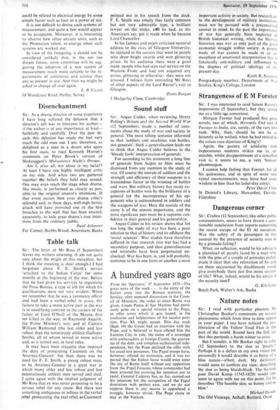Table talk
Sir : The letter of Mr Ross (5 September) leaves my withers unwrung. (I am not quite sure about the origin of this metaphor, but I think the meaning is clear enough.) I had forgotten about F. E. Smith's service 'attached to the Indian Corps' for some months at the beginning of the war. Before that he had given his services to organising the Press Bureau, a type of job for which his qualifications were not very evident. When we remember that he was a yeomanry officer and had been a verbal rebel in posse, the failure to take a more active part in the war is in unedifying contrast to the careers of the father of Lord O'Neill of the Moyne, first NIP killed in the war; of Raymond Asquith, the Prime Minister's son; and of Captain William Redmond (the last older and less robust than the notoriously athletic Galloper Smith), all of whom served in more active and, as it turned out, in fatal roles.
It may have been etiquette that imposed the duty of prosecuting Casement on the Attorney-General: but then there was no need for F. E. Smith, a young robust man, to be Attorney-General in a great war in which many older and less robust and less ostentatiously athletic men served and died. I quite agree with the implied judgment of Mr Ross that FE was never proposing to be a serious rebel for any cause. But there was something ambiguous or odious in the verbal rebel prosecuting the real rebel, as-Casement
pointed out in his speech from the dock. F. E. Smith. was simply that fairly common but not very admirable type, a brilliant lawyer on the make, aft! he had, as the Americans say, got it made when he became Lord Chancellor.
In his famous and much criticised rectorial address to the dyes of Glasgow University, he rejoiced in the success that went to people who drew bright swords and won glittering prizes. In his audience there were a good many people who had seen real service on the Western Front and had not acquired any prizes, glittering or otherwise: they were not amused. I refrain from reminding Mr Ross of other aspects of the Lord Rector's visit to Glasgow.


































 Previous page
Previous page